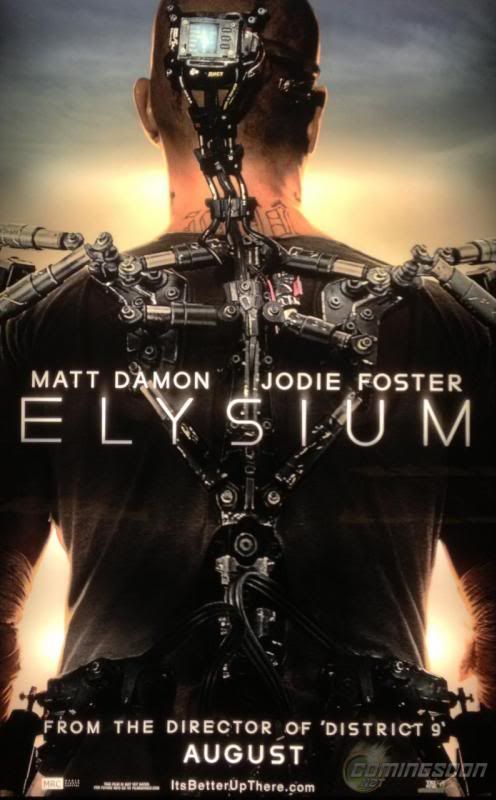The summer of 2013 has been a difficult one in terms of finding truly great films. Most of the fare out there is either sequels or trash, and sometimes trashy sequels. Original ideas seemed few and far between. For the most part, I was looking forward to two films that looked like they might breathe fresh air into both cinemas and the sci-fi genre in particular. Both were not only unique in premise, at least insofar as they were not based on previous intellectual property, but they also were helmed by visionary directors who are favorites of mine. One was Guillermo del Toro’s Pacific Rim, which I thoroughly enjoyed, and the other was Neill Blomkamp’s Elysium.

Max DaCosta was not having a good day. Already on the wrong side of the bed, he sassed one of the robot police at his bus stop, and got his arm broken for his trouble. Elysium, the space platform orbiting Earth populated by the super-rich and elite, hangs overhead as he explains this first to his robotic parole officer and then to his brusque foreman at the factory where the robots are built. When he suffers a workplace accident during this terrible day which will leave him dead by the end of the week, he resolves that he’s going to get himself to Elysium, where he’s certain he can be healed. Meanwhile, Elysium’s strict and brutal defense secretary finds herself fed up with the sitting government, and looks to make a change without having to worry about pesky things like elections and the opinions of the people.
Much like District 9, Elysium wraps its lived-in and utilitarian sci-fi aesthetic with a good dollop of social commentary. Disparity seems to be Blomkamp’s focus of choice, this time on wealth & class disparity rather than racial. As necessary as such commentary is, especially delivered supposedly hidden within a summer blockbuster, the problem with Elysium is that things are a little on-the-nose. Storytelling with purpose is a subtle art, and as ignorant as the masses can tend to be, hammering points home with brute force can turn people off from the story and the characters. This, unfortunately, is the case here: the lingua franca being Spanish feels realistic enough in the sordid squalor of Los Angeles, but when Jodie Foster starts talking like a female Dick Cheney, you get the distinct impression you know where this story is going.

Blomkamp still keeps his violence brutal, direct, and short – which is great.
It could be argued that storytelling is more about the journey than the destination. When it comes to Elysium, the journey is at least entertaining and at times breathtaking to behold. Blomkamp still has a knack for visuals, and his shots of both the floating platform of the well-to-do and the urban decay of the world below feel authentic, realistic, and even lived-in. Things have weight and utility, and the immersion one gets into this vision of the future is palpable. Action is cleanly shot, inventive, and pulse-pounding, making the audience put the lack of subtlety aside while the visceral beats are playing out. If nothing else, Blomkamp hasn’t missed a step when it comes to keeping an audience engaged for the running time of a film.
While the casting in Elysium is decent, and the actors feel authentic and natural in their roles, it’s difficult to point to any of them and say “only this person could have played that role.” While it’s clear that we’re intended to relate to some characters and, to an extent, at least understand others, the characters are a touch too pat and generic to really evoke emotions of empathy. Matt Damon and Jodie Foster and the others are fine, but other than being able to relate to Max’s terrible horrible no-good very-bad day and feeling animosity towards Foster’s ultra-conservative zealot, the characters they play are not all that memorable. The exception, of course, is Shartlo Copley’s Kruger, the slightly unhinged and surprisingly nuanced psychopathic Elysium hitman that is easily the best part of the film.

You wouldn’t want to meet this guy in a dark alley. Or anywhere.
I think a comparison is inevitable, so here’s how Elysium stacks up against District 9. The themes are very similar, but where Elysium slams its plot points and allegories hard, District 9 weaved a more subtle story. Elysium‘s protagonist feels a lot like your typical blockbuster down-on-his-luck tough guy with whom we’re supposed to sympathize immediately, while District 9 gave us a main character who, initially, feels more like a lackey and a spineless jerk than someone who will become capable of anything heroic. Elysium clicks along its rails with expediency and cleanliness with a dollop of predictability; District 9 had a habit of keeping you guessing and, therefore, more engrossed. In spite of being the story involving aliens, in the end, District 9 feels like a far more human story.
In the end, Elysium is decent, but unfortunately lacks the punch and pathos of its predecessor. Blomkamp still has it where it counts, and his film does entertain, but it fails to truly engage in a lasting manner. I’m glad I saw it in the theatre, as much like Pacific Rim, I want to support artists who try something new rather than simply irritating, but Elysium sadly does not do quite enough to break away from the pack and what’s gone before. It’s good. It isn’t great. I expected more. And, if I recall correctly, if the biggest problem you have with a movie is “there isn’t enough of it”, there’s a good indication that something’s being done right.



Leave a Reply